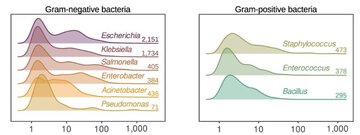Ramiro-Martinez P, de Quinto I, Lanza VF, Gama JA, Rodríguez J. Universal rules govern plasmid copy number
Nat Commun. 2025
"This finding reveals a universal rule in plasmids that will enable the design of more efficient biotechnological tools and improve strategies against bacterial resistance." - Paula Ramiro-Martínez & Jerónimo Rodríguez-Beltrán -
Summary:
Plasmids -autonomously replicating DNA molecules- exhibit a broad range of replication and mobility strategies, genetic repertoires, host ranges, sizes, and copies per cell. However, the determinants of plasmid copy number (PCN) remain poorly understood. Here, we use extensive DNA sequencing data to analyse the copy number of thousands of diverse bacterial plasmids in a comprehensive manner. We find that PCN is highly variable, spanning nearly three orders of magnitude, and that it is intrinsically robust against changes in genomic context. We further show that PCN variability is tightly associated with plasmid lifestyles, and propose the concept of replicon dominance to explain interactions in widespread multi-replicon plasmids. Finally, we uncover a universal scaling law that links copy number and plasmid size across bacterial species, indicating that pervasive constraints modulate the PCN-size trade-off.
Why do you highlight this publication?
This study uncovers a hidden biological rule: across bacterial species, each plasmid tends to carry a similar amount of DNA, regardless of its size, copy number or genetic content in the cell. By analyzing thousands of plasmids, we found that most are tuned to occupy around 2.5% of the host cell's DNA, meaning that small plasmids exist in many copies, large ones in few, but the DNA load per plasmid stays remarkably stable. This insight reveals a fundamental constraint in microbial evolution and offers new tools for improving plasmid design in biotechnology and tackling antibiotic resistance.
Publication commented by:
Dr. Jerónimo Rodríguez-Beltrán and Paula Ramiro-Martínez
Biology and Evolution of Microorganisms group
IRYCIS



